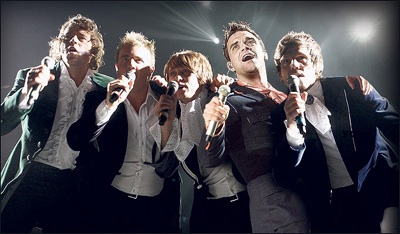An interdisciplinary conference examining the theme of break-up and reunion in popular music acts, focusing on Take That
University of Salford
3-4 June 2011
Extended deadline: 20 April 2011
Organised by the University of Salford in conjunction with the exhibition “Fan Networks in the Pre-Digital Age: Take That Fans 1990-1996”
The long-anticipated reunion of Take That and Robbie Williams and the unprecedented sales figures for their summer tour 2011 offer an excellent opportunity for scholars from a range of academic disciplines to discuss key issues arising from this contemporary popular music phenomenon. From at least the time of the Beatles, the break-up of a favoured band has had profound implications for fans, followers, and the music industry. The convenors invite papers from any discipline which address the themes of break-up and reunion of popular music acts. We are particularly interested in papers addressing these issues in relation to Take That and boy bands generally but welcome any proposals that address these themes more generally in popular music. These themes could include but of course are not limited to:
Literary Studies
- What narrative structures characterise Take That’s journey from their origin to the present?
- Which myths are embedded in the discourses on reunion?
- How has Take That’s own story become inscribed in their music and to what effect?
Psychology
- How does the break-up of a favoured act relate to trauma?
- What psychological functions do reunions fulfil in the lives of fans?
Sociology/Communication Studies
- What social functions do reunions fulfil?
- How has the Internet functioned to maintain interest in bands that don’t exist any more?
Music Industry Studies
- How has Take That’s reunion been treated in the media?
- How does the trajectory of Take That’s reunion compare to that of other boy/girl band reunions (New Kids on the Block, Spice Girls, East 17, et al.)?
- How are different reunions prepared and staged by record companies and what impact have reunions had on record sales?
- How successfully do boy bands negotiate the transition from manufactured teen sensation to credible, established popular music act?
- Which other popular trends in the present or past do such reunions parallel?
Gender Studies
- As boy band fandom is predominantly a female phenomenon, what role do reunions play in the empowerment of young women?
- What role does post-reunion fandom play in the life course of working women, mothers, and wives?
The convenors ask that presenters avoid micro-histories of individual break-ups and reunions and instead address broader issues and themes, perhaps through, for example, comparative analyses. Why, for example, have Take That succeeded so spectacularly when other attempted reunions have failed? What parallels can be drawn from the break-up of other illustrious acts, for example the Beatles?
The conference is held in conjunction with an exhibition in Manchester devoted to the original Take That fans titled “Fan Networks in the Pre-Digital Age: Take That Fans between 1990 and 1996” and is timed to coincide with Take That’s performances in Manchester.
A printed publication of the best papers of the conference is planned.
Please send proposals (300 words or less) for 20 minute presentations, giving name, academic affiliation (if applicable), and key terms by 20 April 2011 to abstracts@fan-networks-exhibition.org
Principal convenors: Tim Wise (University of Salford) Anja Löbert (independent scholar, affiliate of Martin-Luther-Universität Halle-Wittenberg)

